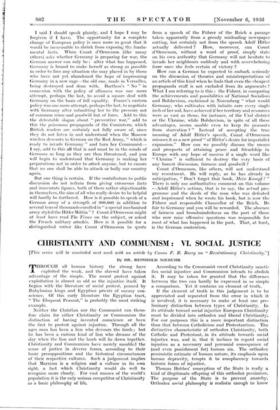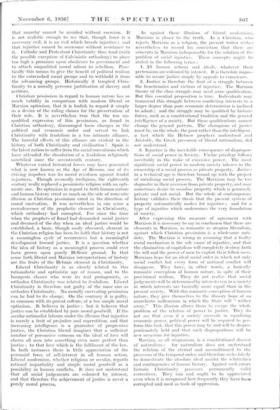CHRISTIANITY AND COMMUNISM : VI. SOCIAL JUSTICE
IThis series will be concluded next week with an article by Canon F. R. Barry on "Revolutionary Christianity."]
By DR. REINHOLD NIEBUHR
THROUGH all human history the strong have exploited the weak, and the shrewd have taken advantage of the simple. The moral protest against exploitation is almost as old as the injustice itself. It begins with the literature of social protest, penned by Babylonian kings and Egyptian priests of uneasy con- science. Of this early literature the Egyptian tract, " The Eloquent Peasant," is probably the most striking example.
Neither the Christian nor the Communist can there- fore claim for either Christianity or Communism the distinction of having invented conscience or been the first to protest against injustice. Through all the ages man has been a lion who devours the lamb ; but he has been a curious kind of lion who dreams of the day when the lion and the lamb will lie down together. Christianity and Communism have merely moulded the sense of justice in diverse forms, according to their basic presuppositions and the historical circumstances of their respective cultures. Such a judgement implies that Marxism is a religion and a culture in its own right, a fact which Christianity would do well to recognise more clearly. For vast masses of the world's population it is the only serious competitor of Christianity as a basic philosophy of life. According to the Communist creed Christianity sancti- fies social injustice and Communism intends to abolish it. It may be taken for granted that the difference between the two can hardly be expressed in so simple a comparison. Yet it contains an element of truth.
If the element of truth in this judgement is to be appreciated and separated from the error in which it is involved, it is necessary to make at least one pre- liminary distinction between types of Christianity. In its attitude toward social injustice European Christianity must be divided into orthodox and liberal Christianity. For our purposes this is a more important distinction than that between Catholicism and Protestantism. The distinctive characteristic of orthodox Christianity, both Catholic and Protestant, in its attitude towards social injustice was, and is, that it inclines to regard social injustice as a necessary and perennial consequence of (and even punishment for) human sin. The orthodox pessimistic estimate of human nature, its emphasis upon human depravity, tempts it to complacency towards historic forms of injustice.
Thomas Hobbes' conception of the State is really a kind of illegitimate offspring of this orthodox pessimism. The purpose of the State is to prevent anarchy. Orthodox social philosophy is realistic enough to know that anarchy cannot be avoided without. coercion. . It is not realistic enough to see that, though force is a necessary evil, it is an evil which breeds injustice ; and that injustice cannot be overcome without resistance to it. Catholic and Protestant Christianity thus tend (with the possible exception of Calvinistic orthodoxy) to place too high a premium upon obedience to government and to attach unqualified moral odium to rebellion. Prac- tically this means to give the benefit of political realism to the entrenched social groups and to withhold it from the advancing groups. Historically it tempted Chris- tianity to a morally perverse justification of slavery and serfdom.
Christian pessimism in regard to human nature has so much validity in comparison with modern liberal or Marxian optimism, that it is foolish to regard it simply as a device of the ruling classes for the preservation of their rule. It is nevertheless true that the too un- qualified expression of this pessimism, as found in Christian orthodoxy, discouraged basic changes in the political and 'economic order and served to link Christianity with feudalism in a too intimate alliance. The harmful effects of this alliance are evident in the history of both Christianity and civilisation ! Spain is the latest nation to suffer from the social convulsions which have attended the dissolution of a feudalism religiously sanctified since the seventeenth century.
Whatever varied. historical forces may have generated what is now known as the Age • of Reason, one of its driving impulses was its moral revulsion against feudal injustices. Though avowedly irreligious, the eighteenth century really rephieed a pessimistic religion with an opti- mistic One. Its optimism in regard to both human nature and human history erred as much on the side of romantic illusion as Christian pessimism erred in the direction of moral enervation. It was nevertheless in one sense a recrudescence of the prophetic element in Clir:stianity, which orthodoxy had corrupted. For since the time when the Prophets of Israel had demanded social justice and dreamed of the day- when an ideal justice would be established, a basic, though easily obscured, clement in the Christian religion has been its faith that history is not a meaningless. cycle of recurrences but a meaningful development toward justice. It is a question whether the idea of history as a meaningful process could ever have grown upon purely Hellenic ground. In that sense both liberal and Marxian interpretations of history are the fruits of the Hebraic element in Christianity.
Liberal Christianity is • as • closely related to this rationalistic and optimistic age of reason, and to the bourgeois classes who • were its real protagonists, as orthodox Christianity was related to feudalism. Liberal Christianity is therefore not guilty of the same sins as orthodox Christianity. No morally enervating pessimism can be laid to its charge.- On the contrary it is guilty, in common- With its parent culture, of a too simple moral optimism. It believes in justice : but it believes that justice can be eStabliShed by pure moral goodwill. If the secular rationalist labours under the illusion that injustice is merely a fruit of prejudice and superstition, and that increasing intelligence is a guarantee of progressive justice, the Christian liberal imagines that a sufficient number of persuasive sermons on the ideal of love will charm all Men into something -even more perfect than justice : to that love which is the fulfilment of the law. In both instances there is little appreciation of the perennial force of self-interest in all • human action. Liberal modernism, whether religious or secular, regards rational impartiality and simple. moral goodwill as a possibility in human conflicts. It -does not understand that all social judgements are coloured by interest, and that therefore the achievement of justice is-never a purely moral process, As against these illusions of liberal modernism, Marxism is closer to the truth. As a Christian. who rejects Marxism as a religion, the present writer wishes nevertheless to record his conviction that there are concepts in Marxism indispensable for the solution of t he problem of social injustice. These concepts might be stated in the following terms : I. All human actions and ideals, whatever their pretensions arecoloured by interest. It is therefore impos- sible to secure justice simply by appeals to conscience.
2. Justice is therefore the fruit of a struggle between the beneficiaries and victims of injustice. The Marxian theory of the class struggle may need some qualification.
But this essential proposition is true. Individuals inav transcend this struggle between conflicting interests to a larger degree than pure economic determinism is inclined to admit ; and the struggle may be qualified by historic forces, such as a constitutional tradition and the general intelligence of a society. But these qualifications cannot change the general pattern. The champions of justice must be, on the whole, the poor rather than the intelligent a fact which the Hebrew prophets understood and Aristotle, the Greek precursor of liberal rationalism, did not understand.
3. Injustice is the inevitable consequence of dispropor- tions of social power in Society. Undue privilege follows inevitably in the wake of excessive power. The most significant social power in modern society inheres in the ownership of a social process as private property. Justice in a technical age is therefore bound up with the project of socialising social process. The Marxians may be too dogmatic in their aversion from private property, and may sometimes desire to socialise property which is genuinely private and not social. But the whole of contemporary history validates their thesis that the present s3-stem of property automatically makes for injustice ; and for a type of injustice which undermines the very foundation of society.
After expressing this measure of agreement with Marxism it is necessary to say in conclusion that there are elements in Marxism, as romantic as utopian liberalism, against which Christian pessimism is a wholesome anti- dote. The Marxian is wrong in assuming that a faulty social mechanism- is the sole cause of injustice, and that the elimination of capitalism will completely destroy both the will and the power of men to exploit their fellow-men.
Marxians hope for an ideal social order in which not only social conflict but every form of national conflict will disappear. They have, in other words, a basically romantic conception of human nature, in spite of their provisional realism. They do not realise that social judgements will be determined by interest even in a society in which interests arc basically more equal than in the present society. With this romantic conception of 'Inman nature, they give themselves to the illusory hope of an anarchistic millennium in which the State will " wither away." This illusion allows them to escape the whole problem of the relation of power to justice. They do not sec that even if a society succeeds in equalising economic power, political power will be required to per- form this task, that this power may be and will be dispro- portionately -held and that such disproportions will be new occasions for injustice.
Marxian, as all utopianism, is a constitutional disease of naturalism : - for naturalism does not understand the relation of the eternal and unconditioned to the processes of the temporal order, and therefore seeks falsely to domesticate the absolute ideal amidst the relativities and contingencies of human history. Against such errors historic Christianity • possesses permanently valid correctives. They can and ought to be appreciated even when it is recognised bow frequently they have been corrupted and used as tools of oppression.















































 Previous page
Previous page